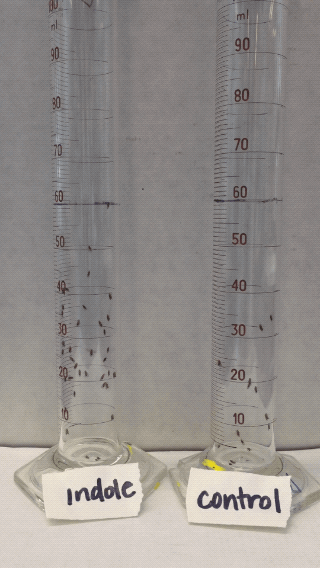Indole, an organic chemical compound that’s found in our gut and contributes to the smell of poop, increases the healthy lifespan of worms, flies and mice, according to new research. Scientists say this likely applies to humans as well, and that this stinky substance could eventually be used to delay age-related diseases.
Image: Shutterstock
New research published in Proceedings of the National Academy of Sciences shows that indole compounds, which are produced by bacteria in the gut, extends the healthy lifespan of a diverse set of organisms, including nematode worms, fruit flies and mice. In tests, animals who were exposed to the compound remained free of age-related health complications over a greater fraction of healthy lifespan than those animals who weren’t exposed to the compound.
Importantly, indole didn’t extend an animal’s overall lifespan — rather, it extended so-called “healthspan”, or the length of time before age-related problems start to creep in. Scientists still need to figure out if indole does the same thing to humans, and how it is exactly that indole generates these observed health benefits. But the lead researcher of the new study, Daniel Kalman from Emory University in Atlanta, is cautiously optimistic that this compound can eventually be used to delay age-related diseases and frailty in humans.
Indoles are a stinky organic compound that actually smells pleasant in small batches. When exposed to the elements, this compound bleeds into the atmosphere in large airborne clumps, which can, unfortunately, be picked up by the human nose. Indole, along with skatole, hydrogen sulfide and mercaptans, is what gives poop its stinky smell. Scientists know that gut indole can influence the way we react to drugs, and even ward off disease, but its health-extending attributes are largely unknown.

To learn more about indole’s potential health benefits, Kalman’s team exposed the compound to worms, flies and mice, and then compared these animals and their levels of health and fitness to those animals who hadn’t been treated with indole. For all species tested, the ingested indole extended several standard measures of healthy lifespan, including physical ability, response to stress, and reproductive capacities. The presence of indole in nematode worms, for example, doubled their reproductive span. And in flies and mice, the indole significantly improved their mobility, both in young and older animals.
The researchers pinpointed the aryl hydrocarbon receptor (AHR) as the key facilitator of these effects. AHR is a molecule that binds small environmental molecules together, including dioxin and agent orange. The exact mechanism of action on the genome, however, is still a mystery, and is currently under study.
“These data raise the possibility of developing therapeutics based on microbiota-derived indole or its derivatives to extend healthspan and reduce frailty in humans,” conclude the researchers in the study. In other words, we may be able to create medicines and/or therapies from our gut biota to delay age-related disorders.
Other research suggests that certain bacteria in our gut can prevent and treat many common diseases, such as heart disease and arthritis. There are about 100 trillion bacteria in our digestive system (some good, some bad), and scientists are still trying to figure out how this massive melange of microorganisms contributes to our health. Some scientists have even started to perform faecal transplants, in which important poop-borne bacteria can be delivered to the digestive systems of people who are deficient. The new study is not exactly like this, but it is related.
“Faecal transplants are an important new tool in treating dysbiosis [the dysregulation of gut microbiota], but it is hard to do them because the bacteria in the gut resist the intrusion of the transplant… and transplants are not always possible in all patients,” Kalman told Gizmodo. “We are trying to figure out what the microbiota produces that makes it protective. We identified indoles as molecules that appear to make diverse animals live better for longer. We see a protective benefit of these molecules when we ‘transplant’ bacteria that produce them (as compared to bacteria that are engineered to specifically not produce them). Importantly, we can deliver these molecules alone to animals and see protective benefit, which could in principle obviate the need for a faecal transplant.”
Kalman says that “evolution has hung on” to this particular biological pathway for a long time (that is, AHR), and that there’s a very good reason it appears in a diverse set of animals. “That is good enough evidence for me to continue to study and develop these molecules,” he said. “It is a complex and long path to develop these or related molecules for humans, and we are not there yet.”
So should you start popping indole pills or sign up for a faecal transplant? Kalman says we need to chill until more is known.
“I’m not comfortable recommending any lifestyle changes other than to keep active and eat a well-balanced diet,” he said. “Active people who watch their diets and take care of their bodies and have regular checkups, live healthier for longer. As the research matures to become more translational, we may be able to tell you more.”
[PNAS]
